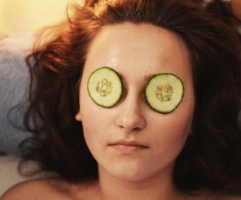Eyes Dry and Sensitive to Light? Could be more than Migraine…
You probably already know that photophobia, or sensitivity to light, is a common migraine symptom. You may also know that migraine patients may be sensitive to light even when they’re not in the middle of a migraine attack.

If you suffer from sensitivity to light, and dry eyes, you might not be thinking about it apart from migraine. But you should be – because these things could be a sign that something else is going on.
Dry eyes may not be unusual, but if it’s worse than normal it could be what is called “dry eye disease” or “dry eye syndrome” (as well as fancier names such as keratoconjunctivitis sicca, and keratitis sicca). We’ll stick with dry eye syndrome, or DES, today.
DES may manifest itself as dry, irritated eyes, feeling like you have something in your eye frequently, red eyes, blurry vision, and photophobia. Ironically, DES may also cause watery eyes.
DES is actually not just one thing with one cause. Several things may work together to irritate your eyes, and there are various sub-categories of DES itself.
For example, an autoimmune disease known as Sjögren’s syndrome may lead to DES. Interestingly, Sjögren’s syndrome has been studied for its relationship to migraine. It is also related to hormone replacement therapy and certain contraceptives. There are various diseases that may cause DES as well.
So why is this important? A recent study in JAMA Ophthalmol (Association Between Dry Eye Disease and Migraine Headaches in a Large Population-Based Study) shows that patients with migraine are more likely to have DES. That doesn’t mean that one causes the other (although there could be a direct link), but it does mean that some of those eye problems you’re having may have another cause – and so, you should get your eyes checked.
There are a lot of ways to treat and prevent DES, and once you have a more specific diagnosis you could see a great improvement (pun intended). Simple things like changing the position of your computer screen or putting a humidifier in the room can make a big difference. There are special medicinal eye drops you may need. There are special sunglasses or contacts you might use, as well as more intense treatments if your case is more serious.
It’s easy to overlook symptoms like eye irritation in the face of massive migraine headaches. But you may find that taking care of your eyes lessens the headaches as well, and improves your overall quality of life.
Also see:
